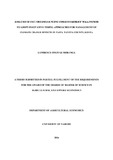| dc.description.abstract | Climate change poses serious economic challenges including low quality and yield of produce and high post-harvest losses leading to low incomes among smallholder tomato farmers. Recent literature shows possible ways of managing climate change, including innovatively altering the timing of farming operations to avoid adverse weather conditions and or taking advantage of favorable conditions. However, available literature on farmers’ decision-making behaviour and the main factors that influence their willingness to adopt innovative management strategies is scanty. The current study addressed this knowledge gap by analyzing factors affecting smallholder tomato farmers’ willingness to adopt innovative timing approaches to manage climate change effects in Taita Taveta County. Three innovative timing approaches, namely, off-season production, transportation of produce during cool periods of the day and processing of tomatoes to extend shelf life were identified at three nodes of the tomato value chain. A two-stage sampling technique was used to randomly select 196 smallholder tomato farmers who were interviewed using semi-structured questionnaires. Descriptive statistics and a Multinomial Logit (MNL) model were applied in data analysis. Results from the study show that farmers are coping with climate change through practices such as early preparation of land, changing planting dates, increasing the frequency and timeliness of weeding and using early maturing crop varieties. The MNL analysis showed that gender, access to credit, group membership, age and income are the main factors that determine farmers’ willingness to adopt innovative timing approaches. These findings offer useful insights for improving the planning of investments in the tomato value chain, for enhanced stability of farm incomes among farmers. In particular, interventions that would help to boost farmers’ uptake of off-season production include improving farmers’ access to credit through lowering interest rates and simplifying application and disbursement procedures of financial service providers, as well as formation of farmer groups to enhance processing of their produce. | en_US |



